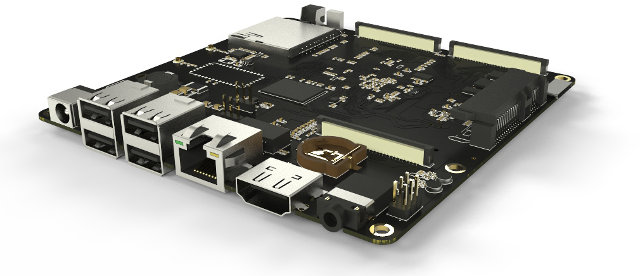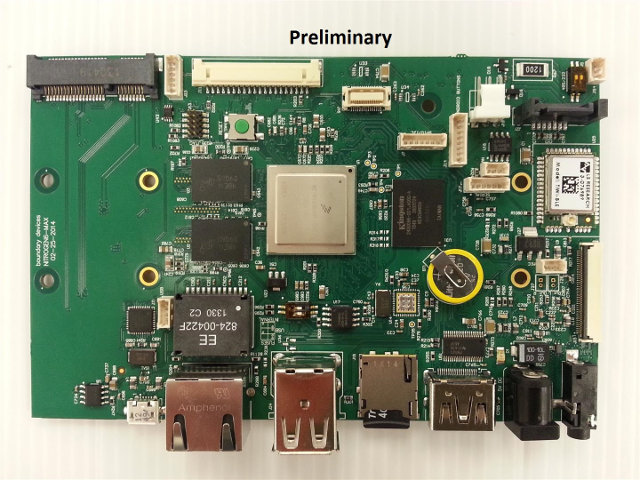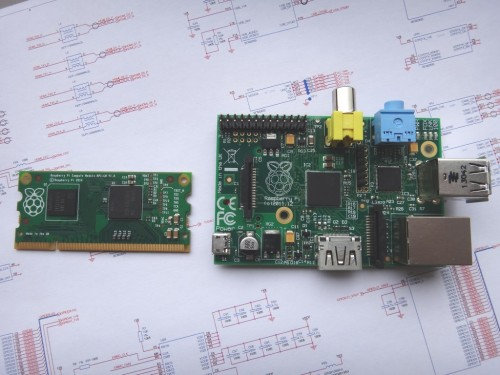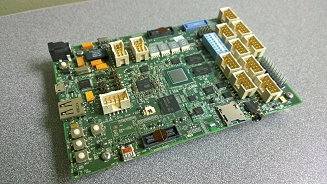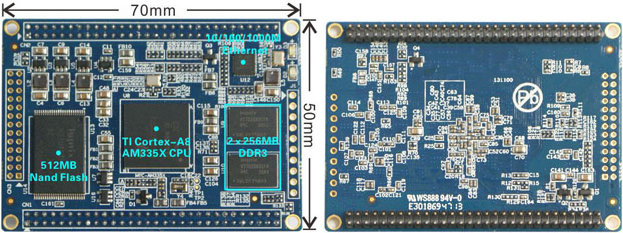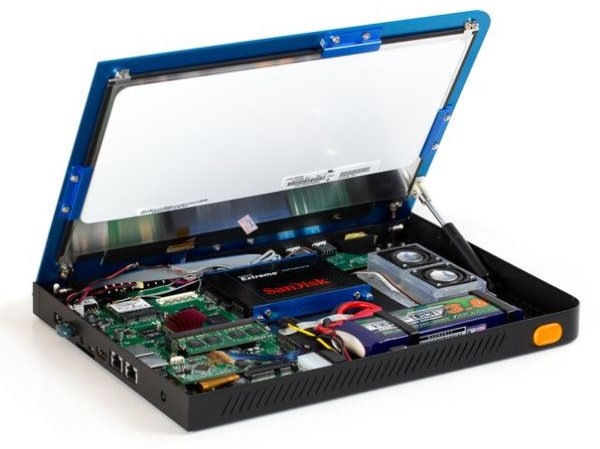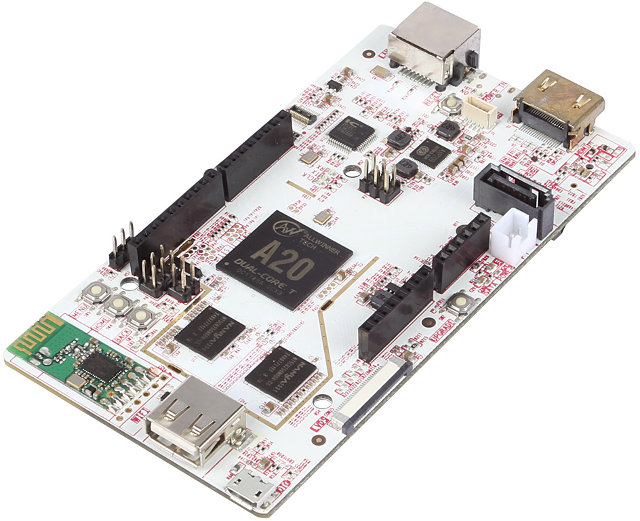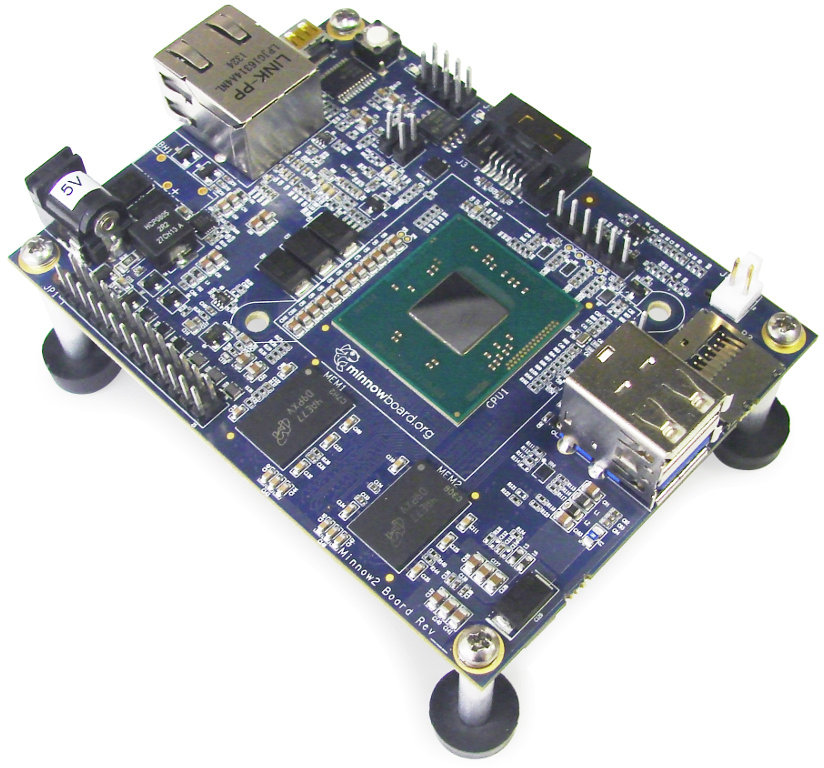Recently most development around AllWinner, at least for Linux, is focusing on AllWinner A20, and there are several AllWinner A20 board and development platforms available on the market such as Cubieboard2, A20-OLinuXino, IBOX and more. But apart from the team at Free Electrons, few people seem to be working on AllWinner A31, so there are few development platform available, if we exclude consumer products such as tablets and Android TV Boxes. There’s now an AllWinner A31 development board thanks to Mixtile LOFT-Q board, which also comes in LOFT Kit to make a complete mini PC with enclosure. Mixtile LOFT-Q specifications: SoC – Allwinner A31 quad core ARM Cortex-A7 processor with PowerVR SGX544 MP2 GPU System Memory – 2GB 64-bit DDR3 Storage – 8GB eMMC (ver 4.51), SATA III connector for 2.5″ drives, and SD card Slot Video Output – HDMI 1.4 up to 1080p Audio I/O – HDMI, 1 headphone/TOSLINK […]
$249 Nitrogen6 MAX Development Board Features Freescale i.MX6 Quad, 4GB RAM, mPCIe Connector, and More
There are now many low cost development boards based on Freescale i.MX6 ARM Cortex A9 processors with Wandboard, Sabre Lite, UDOO, Nitrogen6X among others, all selling for less than $200. Boundary devices, the company behind Nitrogen6X board, has made a new version called Nitrogen6 MAX that maxes out the RAM to 4GB, adds a full mPCIE slot, a dual channel LVDS connector, and 4GB on-board eMMC. Nitrogen6 MAX specifications: SoC – Freescale i.MX 6Q quad core ARM Cortex A9 processor at 1GHz with Vivante GC2000 3D GPU System Memory – 4GB 64-bit DDR3 @ 532MHz Storage – 4GB eMMC, SATA connector, two micro SDHC card slots, 2MB Serial Flash Connectivity – 10/100/1G Ethernet, TiWi 802.11 b/g/n WiFi + Bluetooth BLE module Display Output – HDMI, 2x LVDS, Parallell RGB Audio I/O – HDMI, Analog (headphone/mic) audio and 2W amplified audio Camera I/F – Parallel camera port with OV5642 Interface, MIPI […]
Raspberry Pi Compute Module is a $30 Raspberry Pi Compatible System-on-Module
Albeit the initial goal of the Raspberry Pi board was to address computer science education, it has become extremely popular with hobbyists, has made its way in many different kinds of hardware, and is now clearly the number 1 low cost ARM Linux development board. The Raspberry Pi foundation has then decided to design and sell a system-on-module called Raspberry Pi Compute that people can use in actual products. Since the module will be mostly software compatible with the original Raspberry Pi board, the specs are similar: SoC – Broadcom BCM2835 ARM 11 processor @ 700 MHz with Videocore IV GPU System Memory – 512MB RAM Storage – 4GB eMMC Flash SoM Connector – DDR2 200-pins SODIMM Dimensions – 67.6x30mm board which fits into a standard DDR2 SODIMM connector The main difference is they’ve replaced the SD card slot found in the board, by an eMMC module which is more […]
Microsoft Announces Intel Shark Cove Windows Development Board
There are now plenty of affordable ARM based Android and Linux development board which you can use to develop apps that access hardware drivers, and a few Intel based ones have also started to pop-up such as Galileo and Minnowboard MAX. The problem, for Microsoft, is that none of them currently support Windows. You could always use a PC to develop Windows apps, but this may become a problem once you start dealing with embedded devices and want to access undiscoverable buses such as GPIOs, serial interfaces and so on, as PCs are also protected by secure boot which limits developing and testing third-party drivers. So Microsoft has decided to join the affordable development boards bandwagon, starting with Intel Shark Cove development board for Windows developers. There are very few technical details about the board, but we do know it will based on an Intel Atom processor, and provide access […]
MYIR MYD-AM335X Development Boards & MYC-AM335X CPU Modules
MYIR has recently introduced MYD-AM335X development boards and MYC-AM335X CPU modules powered by Texas Instruments Sitara AM335x ARM Cortex A8 SoCs, (AM3352, AM3354, AM3356, AM3357, AM3358, and AM3359) that come with 512 MB RAM, 512 MB Flash, and a Gigabit Ethernet PHY. The boards and modules target home automation, industrial automation, enterprise/educational tablets, portable navigation devices and networking applications. MYC-AM335X CPU Modules MYC-AM335X CoM specifications: SoC – Texas Instruments AM3352, AM3354, AM3356, AM3357, AM3358, AM3359 ARM Cortex-A8 up to 1GHz with SGX530 GPU (AM3354/AM3358/AM3359 only) System Memory – 512MB DDR3 SDRAM Storage – 512MB NAND Flash Connectivity – On-board Gigabit Ethernet PHY Headers: 2x 2.0mm pitch 60-pin expansion connectors to connect the SoM to a baseboard with the following signals: 2x USB2.0 OTG ports, 6x Serial ports, 2x I2C, 1x SPI, 7x ADC, 2x PWM, 3x SDIO 1x 2.0mm pitch 26-pin expansion interface 1x 2.54mm pitch 10-pin expansion interface Misc – […]
Novena Open Source Hardware ARM Laptop Gets Crowdfunded for $1995
In 2012, Andrew Huang (“Bunnie”) decided to build an open source hardware and software laptop codenamed Novena powered by Freescale i.MX6 as a side project. The goal of the project was to be fully open source, both in terms of hardware and software, and the components have been selected so that the datasheets can be downloaded without NDA. Design has now been completed, and a crowdfunding campaign has now been launched on Crowd Supply, but since finding low cost part was not priority, you’ll have to fork $1,995 to get the complete laptop, $1,195 will get you the desktop version, and $500 the motherboard only. There’s also a version of the laptop called “Heirloom Laptop” with a hand-crafted wood and aluminum case that goes for $5,000. Let’s go through the board specs first: SoC – Freescale iMX6 Quad-core Cortex A9 CPU with NEON FPU @ 1.2 GHz. – NDA-free datasheet […]
pcDuino3 Development Board Features AllWinner A20 SoC, Arduino Headers
The first pcDuino board powered by AllWinner A10 has been available for about a year, later last year pcDuino V2 was released with a built-in Wi-Fi modules and mechanically and software compatible Arduino headers, and now pcDuino3 has been announced in a form factor similar to pcDuino V2 board but replacing AllWinner A10 Cortex A8 SoC with AllWinner A20 dual core Cortex A7, and improving overall specs such as faster Ethernet, the addition of a SATA port, and LiPo support. pcDuino3 specifications: SoC – AllWinner A20 dual core ARM Cortex A7 @ 1.0 GHz, with Mali 400MP2 GPU System Memory – 1GB DRAM Storage – 4GB NAND Flash, SATA connector, and microSD card slot (up to 32GB) Video Output – HDMI 1.4 with HDCP support, LVDS header Audio Out – 3.5mm analog audio interface, I2S stereo digital audio interface Connectivity – WiFi, 10/100M Ethernet USB – 1x USB host, 1x […]
$99 MinnowBoard MAX Development Board Powered by Intel Bay Trail-I SoC
When Intel released the original MinnowBoard which was a step in the right direction, but there were some complains, as the company had chosen to use an older Intel processor, and the price was much higher than most high performance low cost ARM development boards. MinnowBoard MAX (aka Minnow2 Board) fixes all that, as it features the latest Intel Bay Trail-I (E3800 series) processor, and costs as low as $99 for the single core version, and $129 for the dual core version. Let’s jump directly to the specifications: SoC – 64-bit Intel Atom E3815 (single-core, 1.46 GHz) or Atom E3825 (dual-core, 1.33 GHz) both with integrated Intel HD Graphics coming with Open Source hardware-accelerated drivers for Linux OS System Memory – 1GB ($99 model) or 2GB ($129 model) DDR3 RAM Storage – 1x Micro SD card slot, 1x SATA2 3Gb/sec, 8 MB SPI Flash for firmware (UEFI) Video Output – micro […]


